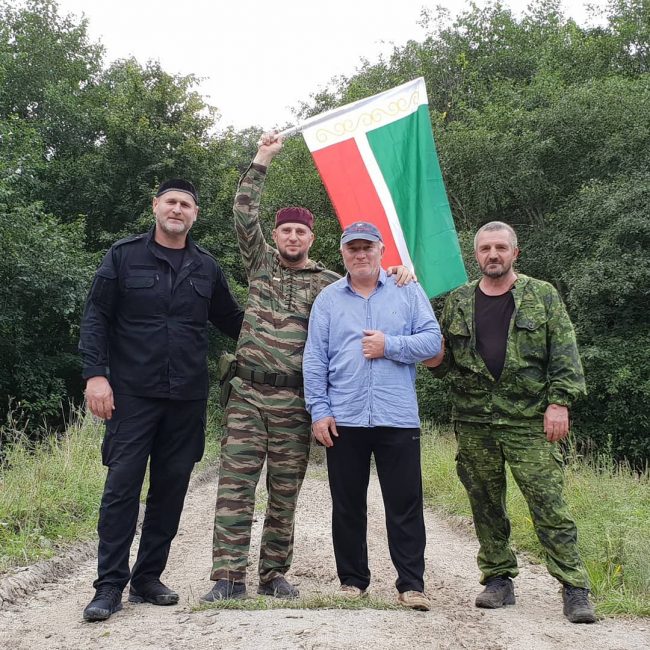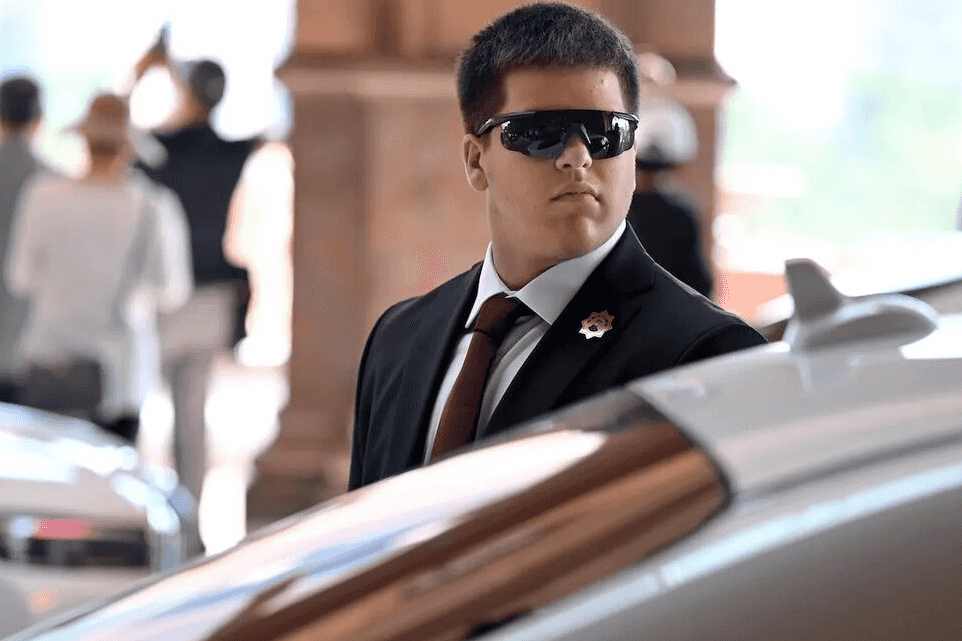

 Allegations of a Chechen ‘invasion’ of Ingushetia sparked outrage from Ingush social media users last week, after a photo emerged online purporting to show a Chechen official raising a flag in an Ingush village. Work on a remote mountain road in Chechnya near the border with Ingushetia has revived a territorial dispute between the two republics.
Allegations of a Chechen ‘invasion’ of Ingushetia sparked outrage from Ingush social media users last week, after a photo emerged online purporting to show a Chechen official raising a flag in an Ingush village. Work on a remote mountain road in Chechnya near the border with Ingushetia has revived a territorial dispute between the two republics.
According to Magomed Yalkharo, a Chechen whose ancestors came from the area in question and who visited the area in August, the road is being built in the Galanchozh District, in the south-west of the republic, starting from the district’s capital, the ruins of the village of Galanchozh. The new road goes towards Ingushetia.
Galanchozh District was formally re-established by Chechen authorities in 2012 but remains almost entirely uninhabited as the result of the deportations of the Chechen and Ingush peoples in 1944. For the same reason, the territories on the Ingush side of the border are also practically abandoned.
[Read on OC Media: After 73 years, the memory of Stalin’s deportation of Chechens and Ingush still haunts the survivors]
In the second half of August, a picture was was disseminated online of Chechnya’s deputy minister of internal affairs, Apti Alaudinov, standing on a road with the Chechen flag raised. The caption of the picture said the men were in the abandoned village of Tsechu Akhkiye, and claimed it was in the ‘Galanchozh District’. Tsechu Akhkiye is located 8 kilometres inside Ingushetia. Alaudinov is a close political ally of Chechen Head Ramzan Kadyrov.
Ingush social media users reacted angrily to to the picture, with many calling for an end to the ‘aggression’ from ‘Kadyrov followers’. A map was disseminated online showing the distance between Chechnya and North Ossetia almost halved, down to just 9 kilometres.
Undefined border
The border between Ingushetia and Chechnya was not officially demarcated after the dissolution of the Chechen–Ingush Autonomous Soviet Socialist Republic in 1992, after which Chechnya was ruled under the independent Republic of Ichkeria and Ingushetia remained a part of Russia.
In 1993, an agreement was concluded between the presidents of Ingushetia and Ichkeria, Ruslan Aushev and Dzhokhar Dudayev, on the ownership of some of the disputed territories. Since then, Chechen authorities have repeatedly voiced claims to territories in eastern Ingushetia, referring to Soviet maps from the 1930s.
For many Ingush, the issue of territories is especially painful because after the Ingush returned from the deportations in the mid-1950s, a part of western Ingushetia — Prigorodny District — was in North Ossetia.
Ingushetia’s attempts to reclaim the territories led to a bloody conflict in 1992 and the ethnic cleansing of Ingush people in North Ossetia.
In 2013, Chechen security forces — under the pretext of searching for a group of militants — entered the Ingush village of Arshti, which Chechen authorities claim is a part of Chechnya. The clash between Chechen and Ingush security forces that ensued left six Ingush police officers injured.
The incident led to a deterioration of relations between the heads of Ingushetia and Chechnya. The first meeting after the incident between Yunus-Bek Yevkurov and Ramzan Kadyrov took place in 2015, allegedly after the intervention of Russian President Vladimir Putin.
‘The border conflict has no solution’
Frequent rumors of a possible unification of the two republics has also led to tension between officials in Chechnya and Ingushetia. The authorities of Chechnya rarely comment on the issue, but frequent interventions by Chechnya into the internal affairs of Ingushetia have intensified tension.
[Read on OC Media: a dispute between the former mufti and the head of Ingushetia and the role of Ramzan Kadyrov]
Chechen historian Dzhambulat Suleymanov told OC Media that ‘the border conflict has no solution’, because ‘they want to divide the undividable, a single nation, which the Chechens and Ingush comprise’.
He added that the problem wasn’t raised during the period of the independent Chechen Republic Ichkeria in the 1990s, when Ingushetia remained under Russia’s control, because the status quo was maintained by the leaders of Chechnya and Ingushetia.
Suleymanov said that as both Chechnya and Ingushetia are now regions of Russia, ‘this conflict should not appear at all, but no, it bursts out with periodic regularity’.
He also said that ‘independent Chechnya and Ingushetia would peacefully solve this issue once and for all. We have nothing to argue about when we are united and free in our decision making — without the Russian factor’.
Ingush journalist, historian, and poet Aslan Kodzoyev told OC Media that it was difficult to evaluate the situation on the Chechen–Ingush border since the authorities of both republics have not commented on the issue. According to him, the ‘war’ takes place only online, and there will be no official information on this topic until the end of local elections on 9 September.
He claimed tensions on the border were a result of the Chechen authorities’ aspirations to absorb their neighbouring republics to establish a ‘Greater Chechnya’.
‘The expansionist appetites of Chechen nationalists and politicians include not only Ingushetia, but also neighbouring Daghestan’, he said, adding that ‘this expansionist ideology is rooted in Ichkerian politicians, the heirs and successors of which are nowadays the politicians and rulers of Chechnya’.
Aliskhan Mogushkov, a representative of Ingush cultural association Vainakh [a term collectively designating Chechen and Ingush] appealed to Chechens and Ingush to stick to an ‘ideology of unity and brotherhood’ and a ‘feeling of responsibility for the future, not only for your people but also for your neighbours’. ‘Our fate depends only on us and our prudence’, he added.







